NATO after Lisbon: the main points in the new Strategic Concept
Ralitsa Kovacheva, November 22, 2010
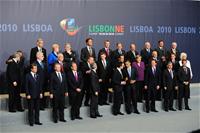 More dialogue with the international civil partners; greater emphasis on the reconstruction of countries affected by conflicts; pooling resources for greater efficiency - these are the highlights in the new NATO Strategic Concept, approved by NATO leaders on the first day of their summit in Lisbon.
More dialogue with the international civil partners; greater emphasis on the reconstruction of countries affected by conflicts; pooling resources for greater efficiency - these are the highlights in the new NATO Strategic Concept, approved by NATO leaders on the first day of their summit in Lisbon.
“This strategic concept is not simply a statement of principles, nor a 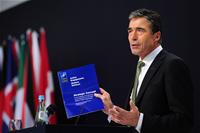 compendium of aspirations, this is an action plan, which set out clearly the concrete steps NATO will take starting today (or, well, may be tomorrow). This action plan will be implemented and it will put in place an Alliance which is more effective, more engaged and more efficient than ever before”, NATO Secretary General Anders Fogh Rasmussen said.
compendium of aspirations, this is an action plan, which set out clearly the concrete steps NATO will take starting today (or, well, may be tomorrow). This action plan will be implemented and it will put in place an Alliance which is more effective, more engaged and more efficient than ever before”, NATO Secretary General Anders Fogh Rasmussen said.
Guiding Principles
In its new Strategic Concept the Alliance:
Reaffirms the bond between the Member States to defend one another against an attack, including against new threats to the safety of their citizens;
Commits itself to prevent crises, manage conflicts and stabilise post-conflict situations, including by working more closely with its international partners, most importantly the United Nations and the European Union;
Offers its partners around the globe more political engagement with the Alliance, and a substantial role in shaping NATO-led operations to which they contribute;
Commits itself to the goal of creating conditions for a world without nuclear weapons. But “as long as there are nuclear weapons in the world, NATO will remain a nuclear Alliance”;
Restates its firm commitment to keep the door to NATO open to all European democracies that meet the standards of membership;
Commits itself to a continuous reform towards a more effective, efficient and flexible Alliance, so that taxpayers get the most security for the money they invest in defence.
The new threats
While the Euro-Atlantic area is at peace and the threat of conventional territorial attacks is low, it cannot be ignored, the paper said. But the threat is now more invisible and unpredictable - for example, the proliferation of ballistic missiles, nuclear weapons and other weapons of mass destruction. “Terrorism poses a direct threat to the security of the citizens of NATO countries”, because extremist groups continue to spread, and advanced technologies increase the threat of a terrorist attack with various weapons. “Instability or conflict beyond NATO borders can directly threaten Alliance security, including by fostering extremism, terrorism, and trans-national illegal activities such as trafficking in arms, narcotics and people.”
Special attention is paid to the new security threats - such as cyber attacks, which “are becoming more frequent, more organised and more costly in the damage that they inflict on government administrations, businesses, economies”. Energy security is another new challenge for the Alliance: “Some NATO countries will become more dependent on foreign energy suppliers and in some cases, on foreign energy supply and distribution networks for their energy needs”. Energy supplies are increasingly exposed at risk of disruption, which would endanger the economy and security of affected countries.
Development of new high-tech weapons, climate change, water scarcity, health risks and growing energy needs shape the future security environment (or more correctly, insecurity), in which NATO will have to act.
Defence and deterrence
The greatest and classical responsibility of the Alliance remains to protect the territory and populations of its Member States against attacks. Deterrence, based on an appropriate mix of nuclear and conventional capabilities, will continue to be among the commitments of the pact. “The supreme guarantee of the security of the Allies is provided by the strategic nuclear forces of the Alliance, particularly those of the United States; the independent strategic nuclear forces of the United Kingdom and France”, the document says.
To fulfill this responsibility, NATO will continue to maintain and improve its abilities to cope with various security threats, including: "Develop the capability to defend our populations and territories against ballistic missile attack as a core element of our collective defence, which contributes to the indivisible security of the Alliance. We will actively seek cooperation on missile defence with Russia and other Euro-Atlantic partners”
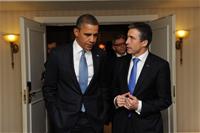 After the summit US President Barack Obama commented: “For the first time, we've agreed to develop a missile defence capability that is strong enough to cover all NATO European territory and populations as well as the United States”. As it is well known, Russia was also invited to join the common system (read our article on the issue here).
After the summit US President Barack Obama commented: “For the first time, we've agreed to develop a missile defence capability that is strong enough to cover all NATO European territory and populations as well as the United States”. As it is well known, Russia was also invited to join the common system (read our article on the issue here).
Arms Control and Disarmament
Regarding the reduction of nuclear weapons, the Strategic Concept reads, that “In any future reductions, our aim should be to seek Russian agreement to increase transparency on its nuclear weapons in Europe and relocate these weapons away from the territory of NATO members. Any further steps must take into account the disparity with the greater Russian stockpiles of short-range nuclear weapons.”
As to the ratification of the START treaty by the US Senate, which is threatened if not by failure, at least by a delay, NATO Secretary General Rasmussen said: "I would strongly regret if the ratification of the start treaty is delayed. A delay of the ratification of the start treaty would be damaging to security in Europe so I strongly encourage all parties involved to do the utmost to ensure an early ratification of the start treaty.”
Lessons from Afghanistan and the Western Balkans
"The lessons learned from NATO operations, in particular in Afghanistan and the 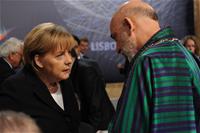 Western Balkans, make it clear that a comprehensive political, civilian and military approach is necessary for effective crisis management. The Alliance will engage actively with other international actors before, during and after crises to encourage collaborative analysis, planning and conduct of activities on the ground, in order to maximise coherence and effectiveness of the overall international effort.”
Western Balkans, make it clear that a comprehensive political, civilian and military approach is necessary for effective crisis management. The Alliance will engage actively with other international actors before, during and after crises to encourage collaborative analysis, planning and conduct of activities on the ground, in order to maximise coherence and effectiveness of the overall international effort.”
Asked by journalists whether the pact had learned its lessons with a 9-year delay, Anders Fogh Rasmussen answered that for such a conclusion it was never too late. And stressed that “NATO has no ambition to take the lead role in civilian reconstruction and development, but we will improve our ability to interact with civilian actors like the UN, the World Bank, Asian Development Bank etc.”.
As regards to Afghanistan, Rasmussen explained that the transitional period would begin in early 2011 and would be completed in 2014. He predicted that after this period, some international military presence would remain in the country, not with military, but rather with supporting functions such as training Afghan forces.
These "lessons" are clearly visible in the specific tasks set by the Alliance in the new Strategic Concept. For the first time, Rasmussen said, it provides to “form an appropriate but modest civilian crisis management capability to interface more effectively with civilian partners, building on the lessons learned from NATO-led operations. This capability may also be used to plan, employ and coordinate civilian activities until conditions allow for the transfer of those responsibilities and tasks to other actors”.
NATO is committed to enhance integrated civilian-military planning, to “train and develop local forces in crisis zones, so that local authorities are able, as quickly as possible, to maintain security without international assistance”, to “train civilian specialists from member states, made available for rapid deployment by Allies for selected missions, able to work alongside our military personnel and civilian specialists from partner countries and institutions”; to “broaden and intensify the political consultations among Allies, and with partners, both on a regular basis and in dealing with all stages of a crisis – before, during and after.”
An Israeli journalist asked the NATO Secretary General why in the draft of the Concept, prepared by the team of Ms Madeleine Albright (former US Secretary of State), Iran and the Middle East conflict were specifically mentioned and now they had been omitted from the official version of the document.
Rasmussen answered that NATO is not involved, as an organisation, in the Middle East conflict. Whether it might be engaged, was difficult to predict, Rasmussen said and explained: first there must be a peace agreement, then the parties must request international assistance and the UN should give a mandate for such an operation, so it is too preliminary to guess. As to Iran, Rasmussen said, without mentioning the country, in the strategic concept the threat of ballistic missile proliferation and the need for a common missile defence are explicitly underlined.
The International Partners
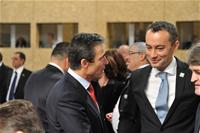 The new strategic concept pays special attention to the relations with the European Union, which is defined as “a unique and essential partner for NATO”. The Alliance recognises the importance of a stronger and more capable European defence and in this sense, welcomes “the entry into force of the Lisbon Treaty, which provides a framework for strengthening the EU’s capacities to address common security challenges”. “NATO and the EU can and should play complementary and mutually reinforcing roles in supporting international peace and security”, the document says.
The new strategic concept pays special attention to the relations with the European Union, which is defined as “a unique and essential partner for NATO”. The Alliance recognises the importance of a stronger and more capable European defence and in this sense, welcomes “the entry into force of the Lisbon Treaty, which provides a framework for strengthening the EU’s capacities to address common security challenges”. “NATO and the EU can and should play complementary and mutually reinforcing roles in supporting international peace and security”, the document says.
Specific steps include strengthening the strategic partnership with the EU; enhancing practical cooperation in crisis operations - from coordinated planning to mutual support in the field; broadening of political consultations on all matters of common interest; better cooperation of capability development, “to minimise duplication and maximise cost-effectiveness.”
The NATO summit was attended by the "Three Faces" of the EU under the 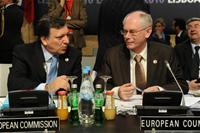 Lisbon Treaty – the President of the European Council Herman Van Rompuy, the High Representative for Common Foreign and Security Policy Catherine Ashton and the President of the European Commission Jose Manuel Barroso. This provoked a Turkish journalist to ask the NATO Secretary General for a “technical explanation” of EU's presence at the NATO Council. The NATO-EU summit did not take place because Turkey vetoed it over the Cyprus issue, the reporter said and asked whether this was a way to bypass the Turkish veto. Anders Fogh Rasmussen replied calmly that there was no bypass and EU representatives were invited to attend and to share opinions, because, he noted, they have no voting rights in the NATO Council.
Lisbon Treaty – the President of the European Council Herman Van Rompuy, the High Representative for Common Foreign and Security Policy Catherine Ashton and the President of the European Commission Jose Manuel Barroso. This provoked a Turkish journalist to ask the NATO Secretary General for a “technical explanation” of EU's presence at the NATO Council. The NATO-EU summit did not take place because Turkey vetoed it over the Cyprus issue, the reporter said and asked whether this was a way to bypass the Turkish veto. Anders Fogh Rasmussen replied calmly that there was no bypass and EU representatives were invited to attend and to share opinions, because, he noted, they have no voting rights in the NATO Council.
"NATO poses no threat to Russia”,
the document explicitly notes. “On the contrary: we want to see a true strategic partnership between NATO and Russia, and we will act accordingly, with the expectation of reciprocity from Russia.” Despite the differences on certain issues, NATO is convinced that “a strong and constructive partnership based on mutual confidence, transparency and predictability can best serve our security.” Therefore, the Alliance is determined to enhance its “political consultations and practical cooperation with Russia in areas of shared interests, including missile defence, counter-terrorism, counter-narcotics, counter-piracy and the promotion of wider international security”.
The concept says that NATO will continue to develop “the partnerships with Ukraine and Georgia within the NATO-Ukraine and NATO-Georgia Commissions, based on the NATO decision at the Bucharest summit 2008, and taking into account the Euro-Atlantic orientation or aspiration of each of the countries”. So, in fact, the "pending" status of both countries was confirmed, who never got a clear perspective for a NATO membership.
NATO's aim will be to facilitate the Euro-Atlantic integration of the Western Balkans; to deepen the cooperation with the current members of the Mediterranean Dialogue and to remain open to the inclusion in the Mediterranean Dialogue of other countries in the region; to develop a deeper security partnership with our Gulf partners and remain ready to welcome new partners in the Istanbul Cooperation Initiative.
More security for less money
During the preparation of the new NATO Strategic Concept, Anders Fogh Rasmussen repeatedly stressed that one of the biggest challenges is to implement it in times of budget cuts and reduced defence spending at national level. So we need to pool our resources and to prioritise better, Rasmussen said in Lisbon, giving as an example the last contracts in the defence area between France and the United Kingdom. Our goal is taxpayers to get more security against the money they invest in defence, NATO Secretary General stated.
Read also the other articles of euinside about the NATO summit in Lisbon.
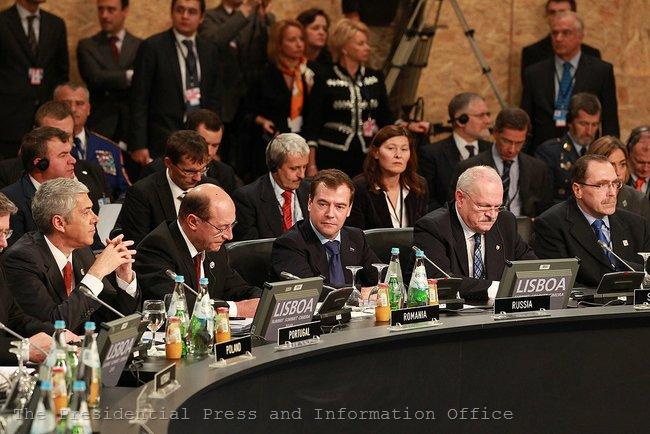 | © The Presidential Press and Information Office
| © The Presidential Press and Information Office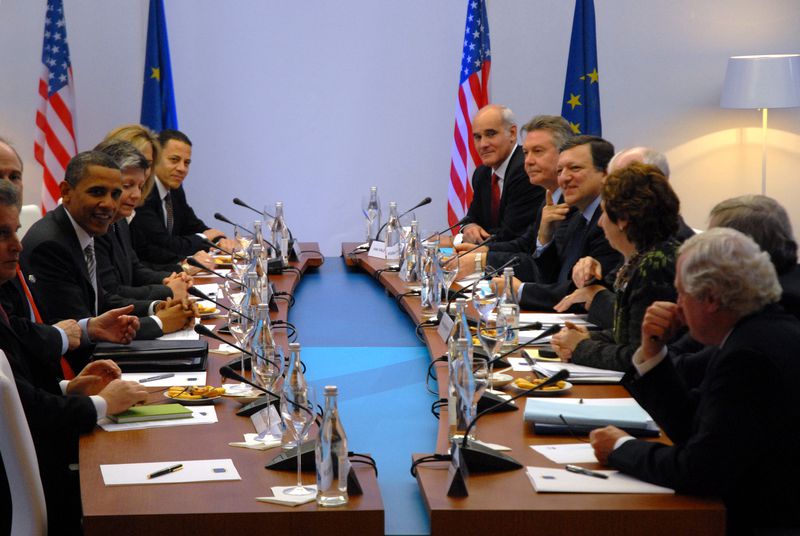 | © Audiovisual service
| © Audiovisual service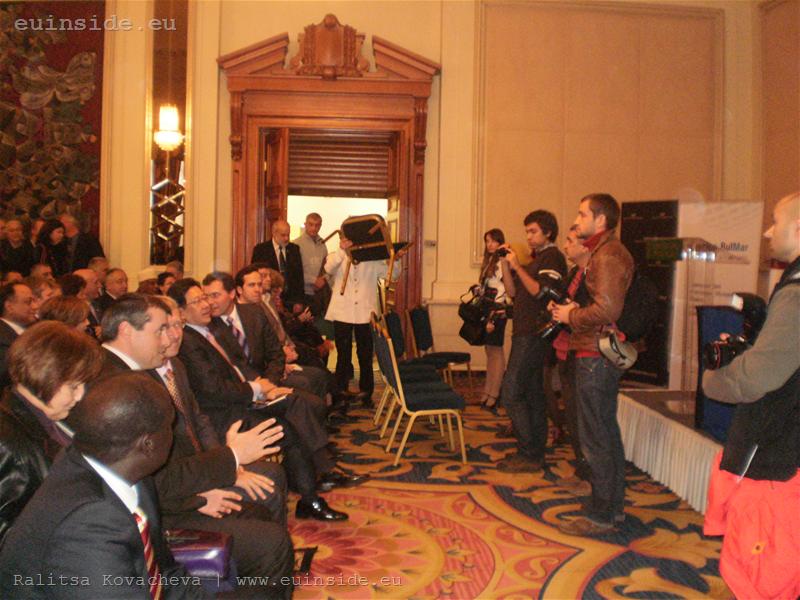 | © euinside
| © euinside